Is The Agora a scam company? Are they legit? There is, and has been for years, a lot of controversy surrounding this company. In this review we'll be taking a look at the messy and, oftentimes, less than ethical game they are playing.
The company is mainly involved in providing investment newsletter services but also has some businesses in the health field. It's complicated and I'll be explaining how this web of connected companies fits together in a bit.
There's a good chance you've come across some of their promotions, which can usually be described as misleading and deceptive, often making claims of wild riches (if it's one of their investment newsletters being promoted) or a miracle cure to some ailment (if it's one of their health products being promoted).
Some examples from their investment side include the "5G Master Key" that teased a stock to invest in that "could turn a small stake into $97,930 in the months ahead"...

Another good example, but a bit older, was the "Congressional Checks" teaser they promoted back in 2018. This landed them in some hot water with a lawsuit - more on this later.

And then of course there are the ridiculous health product advertisements, such as this one talking about a "Genesis Cell" for brain enhancement...

These are just some basic examples that exist, just some of many.
What Is The Agora?

- Name: The Agora, Agora, Inc, and most recently Monument & Cathedral Holdings
- Industry: Publishing (investment & health) and supplements
- Website: theagora.com
- Founder: Bill Bonner
We're not talking about the political and social gathering places of ancient Greece, which is where the word "agora" originally came from. What we're talking about here, of course, is the company behind the many investment newsletter services out there, as well as alternative health products.
The Agora, Agora Inc, or one of the company's newest names... Monument & Cathedral Holdings (M&C) has received quite a lot of backlash from consumers, which explains the low ratings of their affiliated companies on websites like Trustpilot and the BBB.
The structure of the company is a bit complex, but in a nutshell they are a network of many smaller companies "in the publishing, information services, and real-estate industries" - according to Wikipedia.
In more understandable terms, The Agora is a network of investment publishing and health publishing/supplement companies that markets investment newsletter services as well as health newsletters and supplements.
What Wikipedia also tells us is that there are more than thirty companies under their umbrella. While this is true, according to Truth In Advertising (TINA), the Agora has "more than 80 entities under its umbrella".
While I haven't been able to find the exact number of companies under The Agora, this isn't that important. We know that there are a lot, and we know that The Agora themselves claim that the company is the "largest independent research network on the planet"... providing investment research as well as health research - mainly.
Some of their more well-known companies include...
- Agora Financial
- Banyan Hill Publishing
- St. Paul Research
- Palm Beach Research
- The Oxford Club
- Brownstone Research
- Money Map Press
- Stansberry Research
- Empire Financial Research
- Investor Place
- Three Founders Publishing
- Rogue Economics
- NewMarket Health
- NewMarket Publishing
- Health Sense Media
- Health Sense Publishing
- Health Sciences Institute
- Paradigm Press
These are just some of their "entities".
*Note: The discrepancy between Wikipedia's "more than 30 companies" and Truth In Advertising's "more than 80 entities" could be due to the extremely confusing and complex web of companies we see here. Sometimes these Agora companies will have other companies under them, branching out more and more. Maybe Wikipedia is only looking at the larger companies under their umbrella whereas Truth In Advertising is looking at all the little ones too - probably the case considering TINA uses the word "entities".
And according to Truth In Advertising "these entities have formed a multilegged marketing machine that inundates consumers with a barrage of deceptive marketing".
This is a statement that most people, including myself, can agree with. It's painfully obvious that the company operates on the edge of the law, deceptively but often legally.
Company Updates:
So we know that The Agora is a complex and messy network of companies that don't exactly have very good reputations.
Changes to the many the companies that fall under their umbrella are rather frequent - a new company popping up here, a merger between two companies there, the disappearance of another company and so on.
These name changes, mergers, etc. are likely, in my opinion, often due to the lousy reputations they have. A bad reputation isn't good for business, so why not just create a new company with a fancy new name and market the same old products... or maybe change the names of them too?
For example...
- St. Paul Research (stpaulresearch.com) was launched in 2019 by Agora Financial (agorafinancial.com), which led to the company moving much of its services over to this new company.
- This came after a big lawsuit from the FTC against Agora Financial (more on this later).
- The Agora Financial website used to have a news alert about this at https://agorafinancial.com/news/agora-financial-launches-new-imprint-st-paul-research/, but this page has since been taken down, likely to help distance the new brand from controversy.
- Also, Bonner & Partners, which was an Agora company that started in 2009 and was one of the biggest, recently ended up splitting into Rogue Economics and Brownstone Research.
- Was it to avoid the unfavorable reputation this long-standing company held?
There are other examples as well, but you get the point. The Agora companies seem to be pretty fluid. They come and go, or rather... they stay the same but their names come and go.
I found a review of their Money Map Press company on Pissed Consumer that has realized this as well.
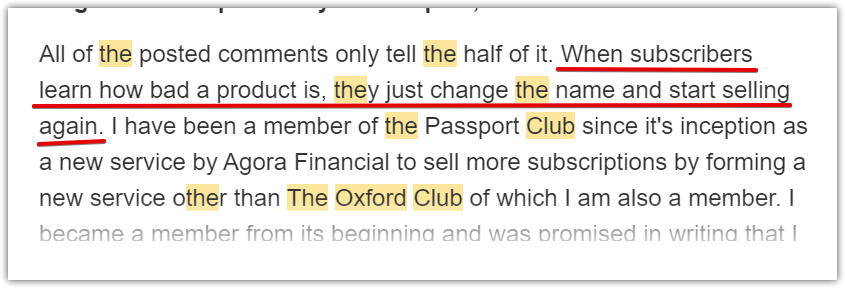
Is The Agora's new name of Monument & Cathedral Holdings (M&C) another way to separate the company from its past? Could be.
Background:
The Agora was founded by Bill Bonner in 1978. It started out in Washington DC as a small publishing company. Bonner created it with the goal of publishing information that wasn't being covered by the mainstream media, its first newsletter service being International Living which published about working, investing, and retiring overseas (this newsletter service actually still exists).
Since then the company has grown exponentially. They have since relocated to Baltimore and in 2016 the publishing giant purchased a five-story office building on Charles Street, which was its 12th building in the Mount Vernon-Belvedere area.
Fun fact: Bill Bonner is said to be an "ardent preservationist" and had the building restored while keeping its old style.
But this is just The Agora's presence in the US. Additionally, the company's publishing businesses span 15 countries - a large company indeed.
And besides Baltimore, in the US they also have some of their publishing businesses listed in Delray Beach, Florida, (Palm Beach Research, Rogue Economics, Casey Research, etc.) as well as some listed in Frederick, Maryland (New Market Health, etc.).
I'm still a bit confused about the name change to Monument & Cathedral Holdings (M&C). This came about in 2021 and could simply be a restructuring of the business to make things easier. After all, this is a holdings company and it makes sense that there should be one with all of the little Agora companies floating around.
But will they transition away from being known as "The Agora" altogether? This I'm not sure of.
What They Provide
The Agora companies are mostly of the publishing variety, although some of their health companies do sell supplements as well.
The majority of their products/services are investment newsletters. And while we are told that "each Agora company is independently operated", they all follow the basic Agora blueprint in many ways.
A typical investment newsletter will provide subscribers with something like:
- Monthly briefings and investment recommendations
- Weekly updates on the market and current positions
- Trade alerts when necessary
- Model portfolio access
- Members area access to an archive of past content
- Special reports (this is usually how they lure in new subscribers)
Depending on how complicated the investment/trading strategy is, some services may also include a guide to getting started of some kind, or even some training, but these are the basics.
Typical Example: This is what you get with Paul Mampilly's Profits Unlimited newsletter service. It's a very typical example...
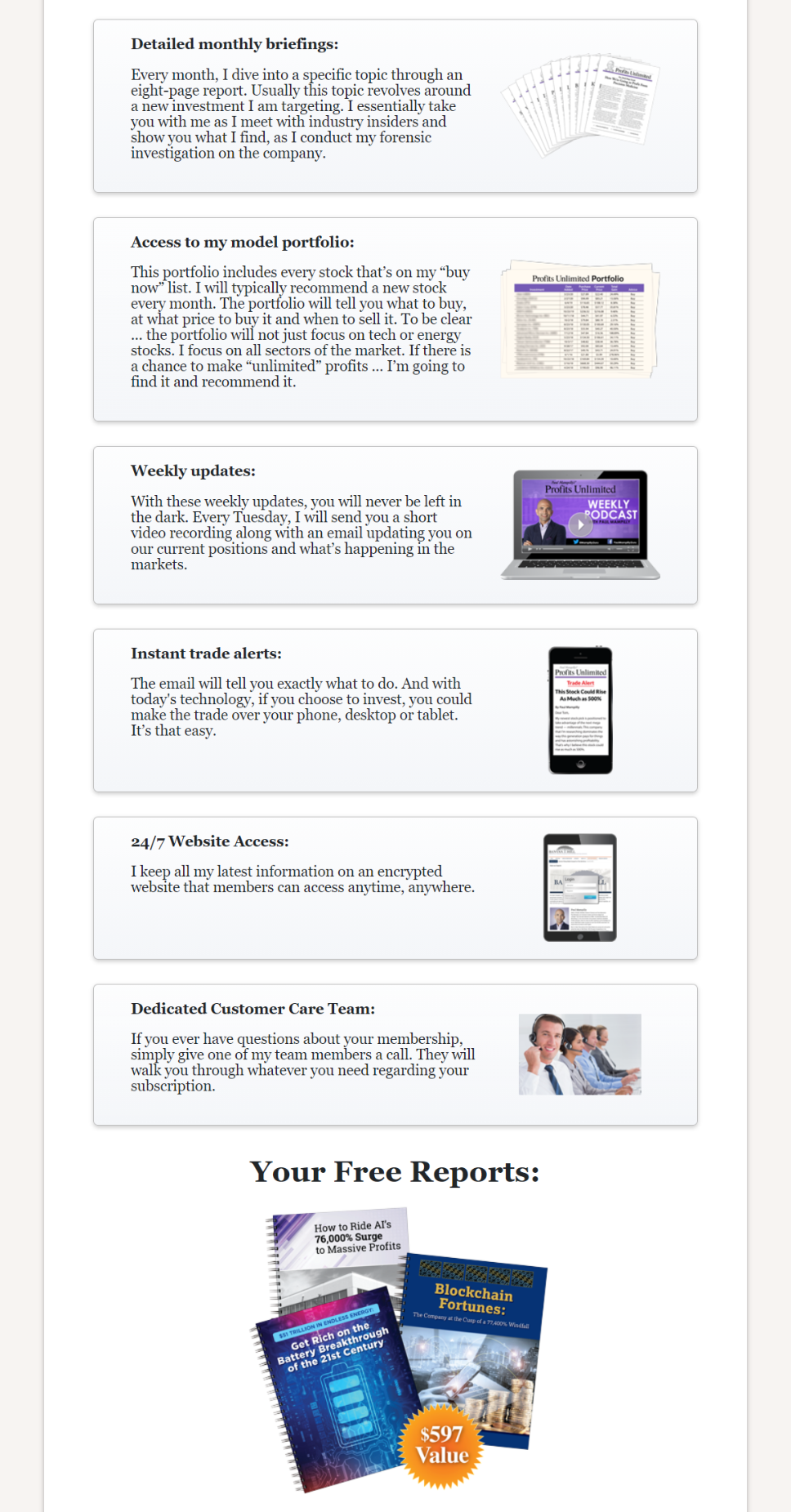
For their health newsletter services, you can expect something like this...
- Monthly alerts on the latest cures and research findings
- Daily emails providing info on important health news
- Members area access where one can see an archive of all past alerts/info
Typical Example: This is what you'd get if you were to sign up for Health Sciences Institutes membership...
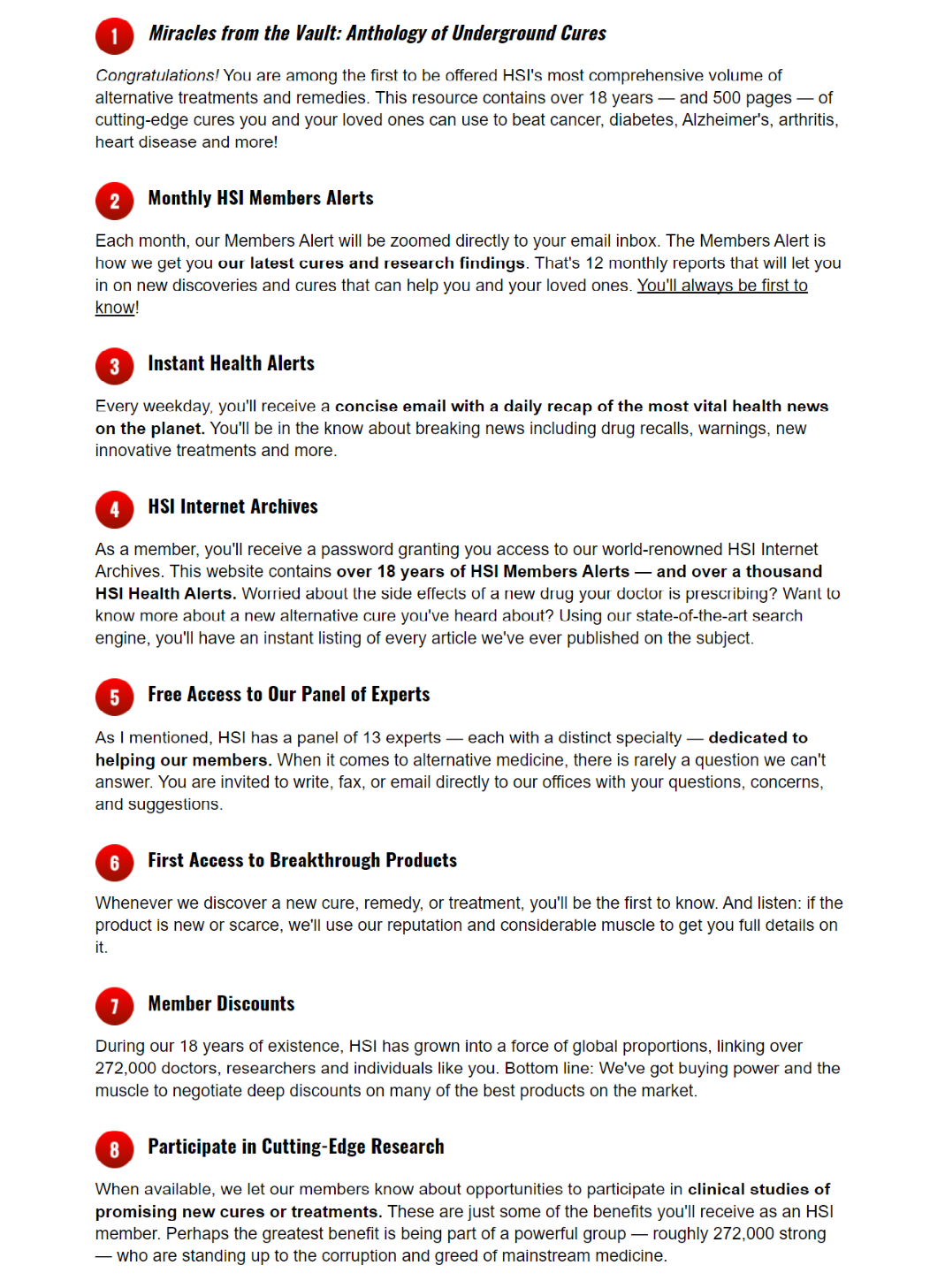
Lastly, some of The Agora's health companies also sell supplements. These are natural supplements formulated to treat health issues in a bunch of different areas, such as joint support, pain relief, sexual health, diabetes, and so on.
These products are from NorthStar Nutritionals, which is a supplement company underneath NewMarket Health (another company underneath a company).

These products are marketed in the typical manner that I'll explain more about below - using fear-mongering and scare tactics to entice senior citizens to whip out their credit cards and order.
How It Works
There's a rather typical marketing blueprint that The Agora companies follow most of the time.
How it works is like this:
1) Use fear to grab the viewer's attention
- This could be fear of some impending doom or it could be FOMO (fear of missing out) in the way that if a viewer doesn't jump on the investment opportunity right away they could miss out big-time.
- It could also be the fear of illness or even death, as is often the case with their health-research companies' marketing strategies.
2) Offer a solution
- Maybe it's a solution to get in on the biggest investment opportunity of the decade, or a natural solution to some life-threatening health concern.
3) Entice with more exaggerated information, but not enough to take action
- The opportunity is usually hyped-up to extreme proportions with additional information, but not enough to actually take action. After all, they are in the business of making money.
4) Provide something for "free", but make viewers pay
- Usually, some "special report", or maybe even a book, is offered for free, but in order to get ahold of it you have to buy into some newsletter subscription service.
*When looking at #3 & #4 of this marketing blueprint, it's a bit different when it is supplements they are selling, but the beginning strategy is usually the same.
Let's take a look at some examples.
Example #1: The "5G Master Key"
In this case, Dave Forest from The Agora company called Casey Research teases the opportunity to invest in what he calls the "5G Master Key"...

In this presentation, Dave talks about 5G's "fatal flaw" and how one company is making technology that will fix it. The company teased makes satellite stations that receive signals from satellites, and of course, time is of the essence.
According to him, "you must get in position" now - good old FOMO...
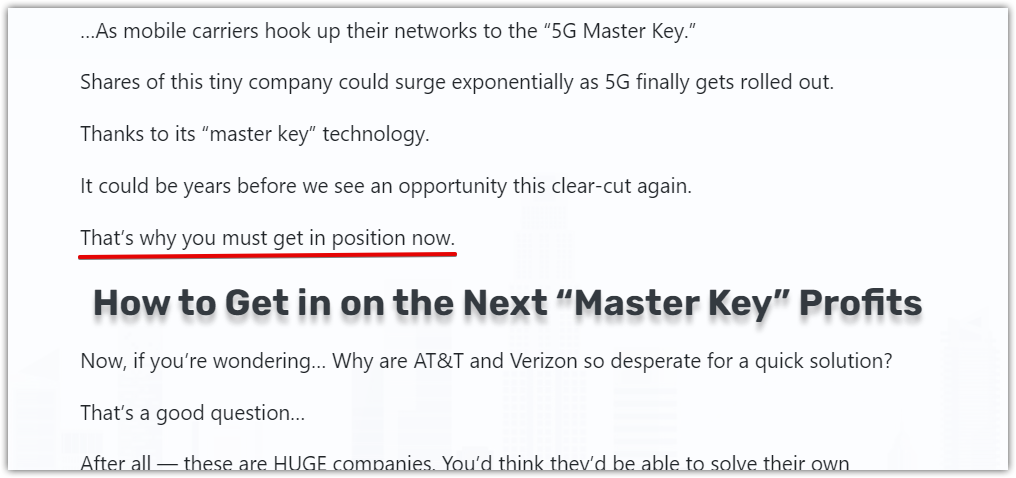
And while the truth of the matter is that getting in early on investments can make a world of difference, Agora company promotions often go a little overboard with their urgency claims.
In fact, I've come across quite a few presentations promoting investment opportunities that claim you have to get in before such and such a date. Then, that date will come and pass and what they'll do is simply update the presentation to say some other near-future date.
In this "5G Master Key" promotion we are given a lot of hyped-up information. We're told that 5G has a "fatal flaw" and that a tiny company offers the solution to this. And we're also gold that we could get rich by investing in this tiny company.
But, not too much info is given. To find out the name of what's being teased, you'd have to read the "free" report that's being given out, which really isn't free. You have to subscribe to one of their investment newsletter services, Strategic Investor in this case which costs $49/yr for the most basic subscription.
*Here at Green Bull we've already exposed this stock pick by the way.
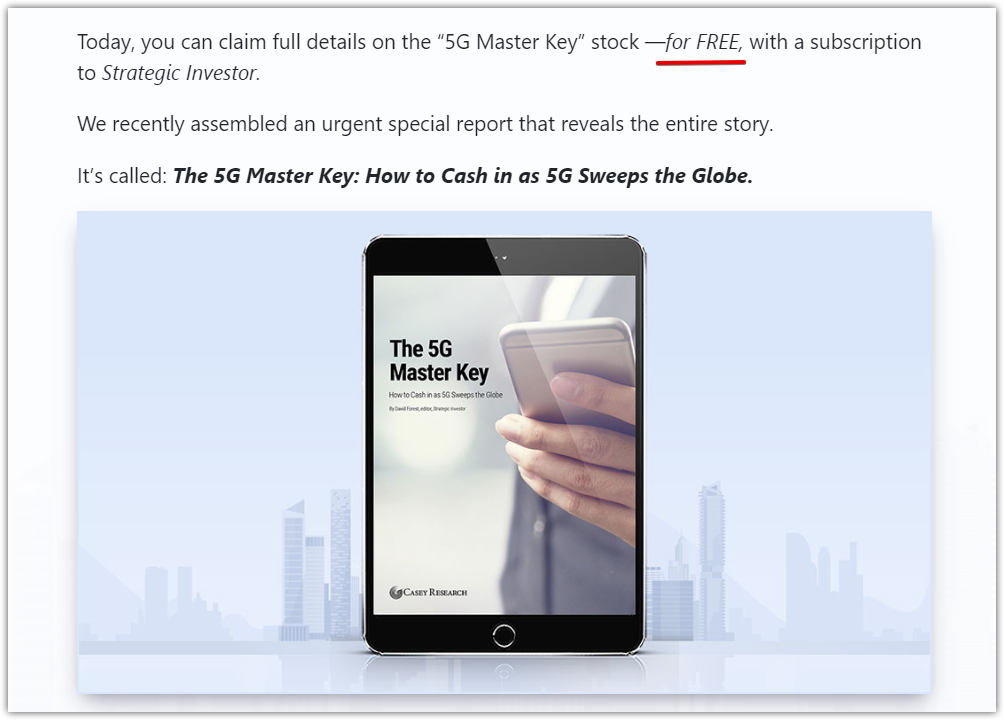
This newsletter provides the typical monthly recommendations, updates, etc. that I went over in the previous section.
Example #2: "Dead On Arrival"
Take this as another example - coming from one of their health research companies, Health Sciences Institute (HSI), which is the self-proclaimed "premiere global information network" for alternative medicine.
Here we have a teaser video that uses the all-too-common fear-mongering tactics to pretty much scare the elderly into listening to the entire long-winded presentation.
In a nutshell, this presentation warns people about the deadly side-effects of common FDA-approved prescription drugs, stating that the elderly in the US are being used as guinea pigs for fast-tracked drugs and that "if you were born before October 1955, you could be at severe and immediate risk".

Now, while these presentations are very professionally put together and often based on truths, they are almost always deceptive and misleading in the name of marketing and selling as many subscriptions/supplements as possible.
Here, after scaring viewers about possible death if they continue to take prescription pills, of course, "safe natural remedies - bona fide miracles" are presented to treat certain ailments.
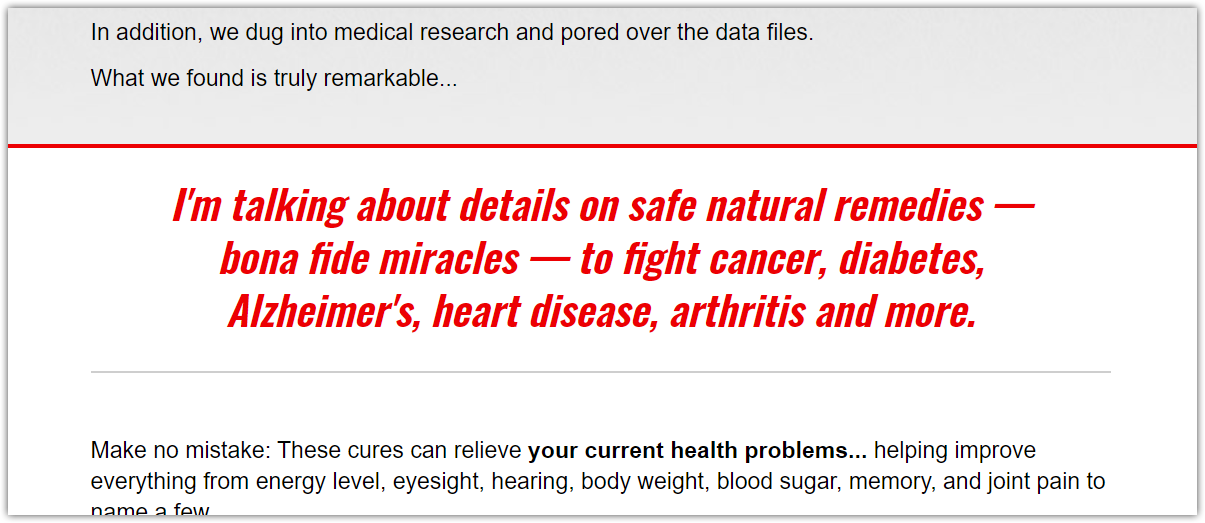
All of the information on these "bona fide" natural miracle cures are provided in a 500+ page book put together by HSI called Miracles From THE VAULT, which is advertised as being "free" to get your hands on...

However, of course, this is not really free. Following the typical marketing blueprint, in order to get ahold of it you'd first have to subscribe to become an HSI Member.
This costs $74/yr but there is also a 50% discount provided for seniors over 60.
This is the typical "conspiracy"-type strategy used in their health product promotions. According to a journal report I found, which I think sums up this type of promotion nicely...
Publishers of such commercials often use a "conspiracist strategy" in two interrelated steps. They first raise fears of government collusion with 'Big Pharma.' They then call citizens-cum-patients to protect their liberties from hidden machinations by buying 'hidden' or 'censured' cures. While doing so they employ a series of means to seem professional yet persecuted; scientific though in clandestine. Their graphics and apocalyptic narratives necessitate patients to take swift actions. By manipulating fears and conspiratorial suspicions, entrepreneurs promise suffering 'patriots' that by choosing their alternative cures they would win back their liberty and health.
Now I'm certainly not saying that I trust Big Pharma or don't believe in government collusion, but I do believe that Agora companies prey on public fears to market their products as much as possible, and as you will see a bit later in this review, they make the process of canceling a subscription much more difficult than need be.
Their Team of "Experts"
Bill Bonner is the founder of it all, so let's talk about him first.
He doesn't have any fancy Wall Street background, but he is a business-savvy individual and has had great success in his various business ventures, of which The Agora seems to be the most successful.
Bonner went to Georgetown University Law School and started out working for Jim Davidson at the National Taxpayers Union, founded The Agora in 1978, and helped grow the business from a small-scale idea-sharing newsletter service to the "largest independent research network on the planet".
Bonner is also an accomplished author/co-author of many economic-focused books, many of which take somewhat of a doomsday approach to the financial situation in the US due to demographic trends, the rising national debt, trade deficits, and more. "Financial Reckoning Day", "Empire of Debt", and "Mobs, Messiahs, and Markets" are among his most successful, all three of which were New York Times bestsellers.
While there is logic behind much of what he says, many of his predictions have yet to be realized, but that's not to say that they are wrong.
For example, Bonner started warning about the collapse of the credit system in the US back in 2015 and wrote about how the US "empire" will collapse due to deficit spending in his 2009 book "The New Empire of Debt: The Rise and Fall of an Epic Financial Bubble".
Neither has happened as of now, but it could just be too early to call.
Some other fun facts about Bonner include that he has made investments on 5 continents, owns hundreds of thousands of acres of land, and travels about 100,000 air miles every year. Quite impressive.
And while Bill doesn't have the professional background that most people are looking for when entrusting their hard-earned money in investment recommendations, he does have the business smarts to bring people on board that do. Likewise, with the health product arm of The Agora (Health Sense Media, New Market Health, etc.), he brings on-board decorated doctors and the likes.
When it comes to the investment side of The Agora, some other big names he has working for The Agora affiliated companies include the following:
- Paul Mampilly (Banyan Hill Publishing) - His background includes an impressive career on Wall Street, one of his most impressive feats being winning an investment competition during the great recession from 2008 - 2009, in which he was able to bring in a 76% return from a $50 million starting investment.
- Teeka Tiwari (Palm Beach Research Group) - This guy is probably most well-known for his crypto-related investment services over at Palm Beach Research. He's an ex-Wall Street hedge fund manager, was employed by Lehman Brothers at 18 years old, and was the youngest VP ever at Shearson Lehman two years later.
- Jim Rickards (Paradigm Press) - A leading expert on precious metal investments, Rickards is also an author ("Currency Wars: The Making of the Next Global Crisis"), past investment banker, economist, lawyer, and has been a financial advisor to the CIA.
- George Gilder (Three Founders Publishing) - He has been called the "tech prophet." Gilder is a techno-utopian advocate, investor, economist, and author of books such as "Life After Television", in which he predicted the rise of smartphones before the invention of the iPhone, and "Life after Google", in which he predicts that blockchain tech will bring power back to the people and away from tech giants like Google and Facebook.
- Jeff Brown (Brownstone Research) - This guy is an ex-tech executive. He's worked in executive positions at Qualcomm and NXP Semiconductors, which came after receiving a Bachelor's degree in Aeronautical and Astronautical Engineering from Purdue University and later a Master's degree in Corporate Finance from London Business School. No impressive Wall Street career here, but Brown has worked at high levels in the industry he now provides investment advice in... which is what I like to see.
- Charles Mizrahi (Banyan Hill Publishing) - He's another ex-Wall Street veteran. Mizrahi started off on the trading floor of the New York Futures Exchange at 20 years old and eventually worked his way up to having his own money management firm where he oversaw $200 million worth of clients' money. At age 35 he was even named the number 1 trader in the US by Barron's.
- Jeff Clark (Jeff Clark Trader) - Right now his newsletter services are focused on active trading, which differs from a lot of the other experts who focus more on long-term investing. Clark used to have his own money management firm, has helped develop curricula for an international Masters of Business Administration program, and founded an investor education firm.
As you can see, The Agora doesn't skimp out when it comes to bringing high-level people on-board.
*Again, these are just some of the many experts involved in the many investment newsletters Agora brings the public.
And for their health-product businesses, including Health Sense Media and New Market Health, you'll find people like those below backing their products - unsure if these people actually help formulate their health products, however.
- Dr. Richard Gerhauser, MD (Natural Health Response) - Dr. Gerhauser has a medical doctorate degree, two Master's degrees, and used to work at the University of Arizona as a clinical professor. He has yet another impressive background and now runs a newsletter service where he provides non-traditional medical advice and promotes products. However, his name has also been on the chopping block and I'll be talking more about a lawsuit involving him a little later in this article.
- Dr. Allan Spreen, MD - He's not exactly respected by the mainstream medical establishment. Spreen is an MD who has authored and co-authored several books on alternative and natural health treatments, including Tomorrow's Cancer Cures Today, Nutritionally Incorrect: Why the Modern Diet Is Dangerous and How to Defend Yourself, and Smart Medicine for Healthier Living : Practical A-Z Reference to Natural and Conventional Treatments for Adults. He got his MD from East Tennessee State University James H. Quillen College of Medicine and has been in practice for over two decades.
*Note: He is an MD, but I found it curious that when I Googled his name one of the suggestions that came up was "Dr. Allan Spreen quack"...

*I'll go into more detail on this later.
Now, while I can't prove all the self-aggrandizing claims made by the many "experts" that make up The Agora companies, and while I am generally skeptical of bold claims made by those promoting their own services, I have no good reason to doubt the backgrounds of these people.
I have looked extensively into the backgrounds of some of these names, such as into Teeka Tiwari and Jeff Brown, which I even hired a private investigator for to look into his work and educational history, and most claims I've been able to verify.
The truth is that The Agora does go to great lengths to bring people with impressive resumes and experience on board their teams. This isn't the problem. The problem mainly (not always) stems from the marketing side of the business, which I'm sure you are already familiar with - the lure of generational wealth, collecting checks on a regular basis, curing an illness with some magic pill. Deceptive, yet often legal, marketing tactics is where The Agora excels... and this is evident by looking at their reputation.
Business Standings & Reputation
Subject to much controversy, criticism, scam accusations, and even a hefty fine from the FTC (more on this later), it's no wonder why the Agora companies don't exactly have the best business standings.
Let's take a look at some of their standings with the BBB, shall we?
With the BBB:
Here's Stansberry Research's BBB profile, which has a warning for consumers stating that "BBB files indicate that this business has a pattern of complaints". These complaints were concerning billing issues and more - lots of subscribers having trouble canceling their memberships and being charged for subscriptions they were unaware of.
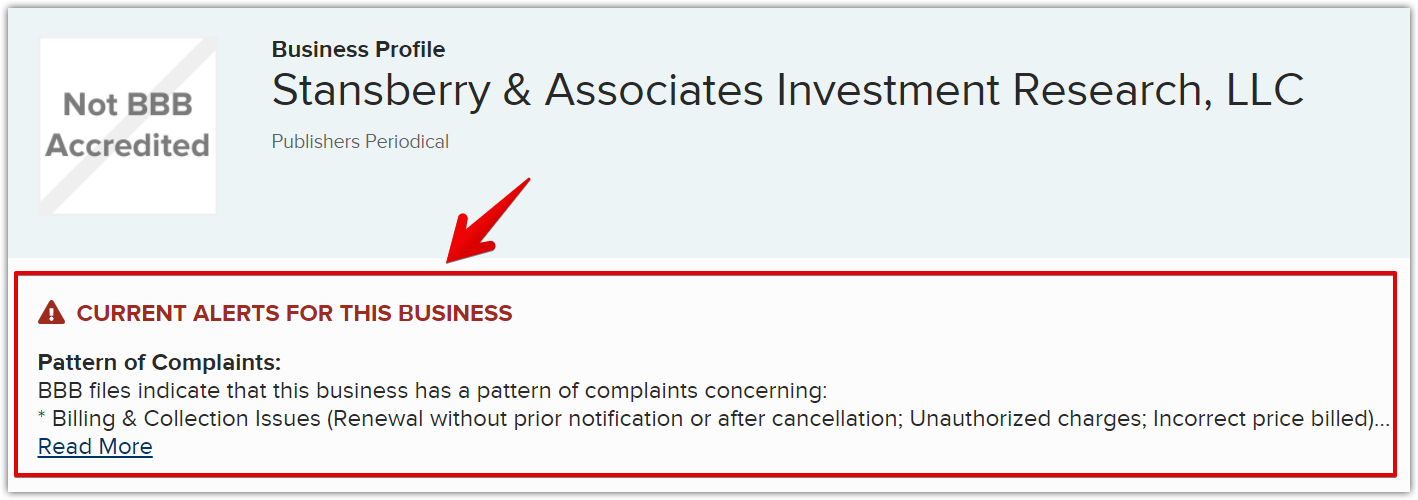
And here's Agora Financial's profile - another warning! This time it's about government action - referring to the FTC lawsuit here, which again, I'll talk about in detail shortly. And there is also an alert about a pattern of complaints against the company.

Should we look at Banyan Hill's profile?
Yet again, another warning to consumers, this time about misleading advertising.

How about their health companies. Let's look at Health Sense Media.
Another warning. This one is referring to the FTC lawsuit again.

The Oxford Club is a big investment research publishing brand they have. Let's take a look here.
As expected, another warning about a lot of problems consumers have been having with the company.
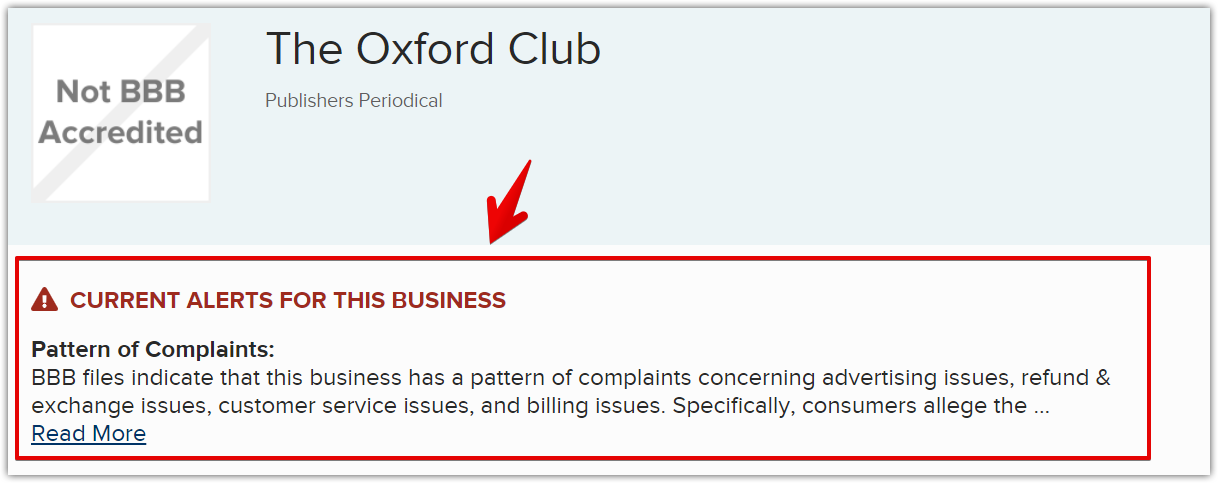
Not looking good.
However, for the sake of being fair and balanced, I do want to point out that there are currently, as I write this, no alerts for Brownstone Research, Palm Beach Research Group, and many others too. That said, still... none of these companies have "good" standings, and all that I've looked at have quite a lot of complaints by disgruntled customers.
With TrustPilot:
Trustpilot is a website where consumers can go to review products/services, similar to the BBB in some ways except they don't help resolve complaints with the companies.
Their standings on this website tell us the same story.
However, the Agora company Banyan Hill Publishing had an unbelievably high rating when I checked...
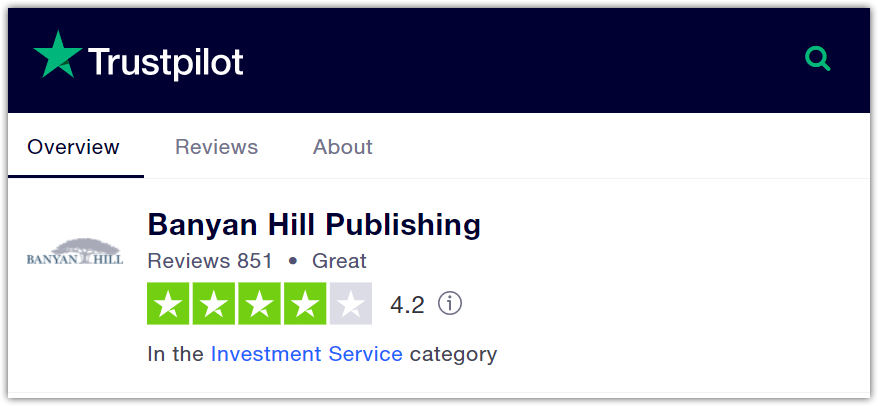
The reason I say "unbelievably" is because I don't believe it.
I don't know how much you can trust these ratings. For 1) it's not uncommon for companies to encourage good reviews on Trustpilot by promising something in return, 2) it's possible to actually hire people to go in and create a bunch of fake reviews to boost ratings.
Why do I think this might be happening? Well, because other Agora company profiles on Trustpilot don't have nearly the amount of reviews. Take a look at Agora Financial and Palm Beach Research Group here, which are comparable to Banyan Hill Publishing in terms of what they offer and size...
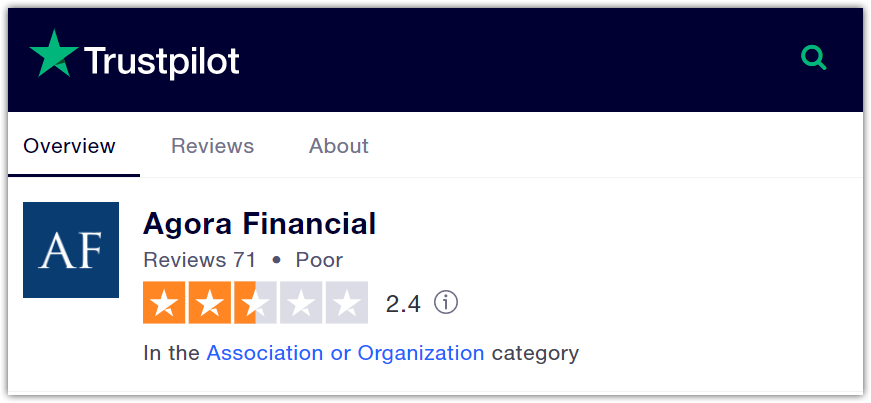

There's about 10x the amount of reviews left for Banyan Hill Publishing.
Fake reviews? Well, I have no proof of this. You can draw your own conclusions.
*Note: A lot of the Agora companies don't have Trustpilot profiles. Out of all the ones I was able to find, Banyan Hill Publishing was the only one with a "good" rating. That said, it's possible there are others I did not find.
Here are some links in case you want to look at the most up-to-date reviews for the companies:
- BBB profile for Agora Financial | Trustpilot profile for Agora Financial
- BBB profile for Palm Beach Research Group | Trustpilot profile for Palm Beach Research Group
- BBB profile for Stansberry Research | Trustpilot profile for Stansberry Research
- BBB profile for Banyan Hill Publishing | Trustpilot profile for Banyan Hill Publishing
- BBB profile of Brownstone Research | Trustpilot profile for Brownstone Research
- BBB profile of Health Sense Media
- BBB profile of The Oxford Club | Trustpilot profile for The Oxford Club
- BBB profile of Omnia Research
- Trustpilot profile of Jeff Clark Trader
- BBB profile of Rogue Economics | Trustpilot profile for Rogue Economics
- BBB profile of New Market Health Publishing
Controversy
These Agora companies have, generally, bad reputations. I don't think anyone can argue with this.
We already know that misleading/deceptive marketing tactics are the norm. Let's take a deeper look, starting with the big lawsuit I've mentioned several times.
Sorry to keep you waiting - a lot to cover here.
Lawsuits:
Phony Diabetes Cure & Money Making Schemes:
This lawsuit was first filed in October 2019 and alleged that Agora Financial and some if its affiliates were tricking the elderly into buying newsletters and such by promising a cure to type 2 diabetes or earning steady cash with some government-affiliated check program.
As usual, both claims were incredibly misleading and led subscribers to feel scammed and defrauded.
There was a guide to treating diabetes being promoted, titled "The Doctor’s Guide to Reversing Diabetes in 28 Days", which pretty much led customers to believe it was guaranteed their diabetes would be cured within this time frame (they actually claimed a 100% success rate). This was being sold for $249 and the guy behind it... Dr. Richard Gerhauser.
***Dr Gerhauser was, in summary, telling people in his book that they can get rid of type 2 diabetes by using special filters to protect one's self from "dirty electricity", or non-ionizing radiation. It's true that cellphones emit low levels of NIR (dirty electricity), but the only “consistently recognized biological effect” found is heating. Whether you want to agree with this or not is up to you, but the FTC didn't find the claims convincing.
The investment part of the lawsuit had to do with what they were calling "Congressional Checks" or "Republican Checks", which led people to believe there were government-affiliated checks that US citizens were entitled to collect on a regular basis. The details for this opportunity were included in a report that was given out if one subscribed to the Lifetime Income Report investment newsletter, which cost $99 per year.
The misleading part was that these checks weren't something you could just start collecting by adding your name to some list, as they led people to believe. Instead, it was all about investing in dividend-paying stocks - not what one would expect. Investors would have had to invest great sums of money to collect the kinds of dividend checks they were touting.
The end result of this lawsuit was determined in February 2021 and Agora Financial along with some of its affiliates (Agora Financial, Health Sense Publishing, Health Sense Media, NewMarket Media, and NewMarket Health, LLC) had to pay over $2 million to defrauded customers.
*Note: According to Truth In Advertising, this $2 million fine only accounted for 0.4% of Agora's revenue. This would mean the company is bringing in (at the moment) $500 million a year in revenue!
That's pretty crazy... especially considering much of this revenue likely comes from misleading subscribers in one way or another.
Investigations:
Back in 2014 Truth In Advertising (TINA.org) conducted an in-depth investigation of Stansberry Research for using deceptive testimonials to promote their newsletter services. These testimonials, or at least many of them, were found to be atypical and misleading, often highlighting great successes but not failures.
After the investigation TINA.org reached out to Stansberry and warned them of the issues with their advertising practices, giving them a deadline to remove such misleading testimonials, or else they said they'd file complaints with the SEC, FTC, and Maryland Attorney General. Luckily for Stansberry, they complied, removing hundreds of deceptive testimonials.
Problem solved? Well, Stansberry is still in business, but based on what I've seen I wouldn't be surprised if there was another investigation opened up into this company.
More Complaints:
Misleading Claims
Besides the misleading claims we've already gone over, here are a few more examples just to give you a better taste of what we're looking at here.
Here's a complaint with the BBB about a blood sugar product sold through their Health Sense Media company...
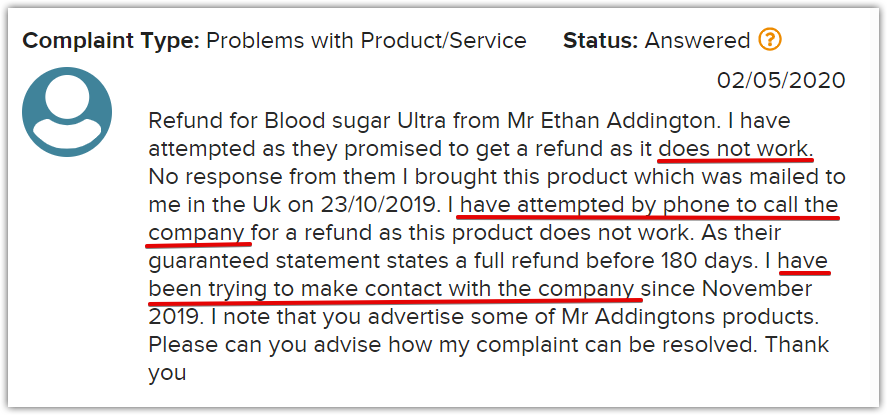
And here's a review of Dr. Allan Spreen talking about his coronavirus cure claims...
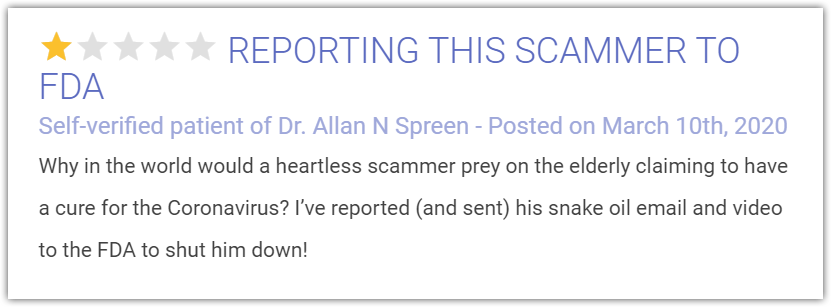
TINA.org actually subscribed to Agora's one health newsletter, Natural Health Today, and found that "it does not contain any secret disease treatments or preventions that are supported by competent and reliable scientific evidence"... which were hyped up in the promotional material.
Furthermore, the one Miracles From The Vault book on natural health remedies that I mentioned above when I went over the "Dead On Arrival" promotion is likely written by an unknown person.
Its author is "Jenny Thompson", but I haven't been able to really find any convincing evidence that the author exists, which is odd considering the size of the book - likely just a pen name.
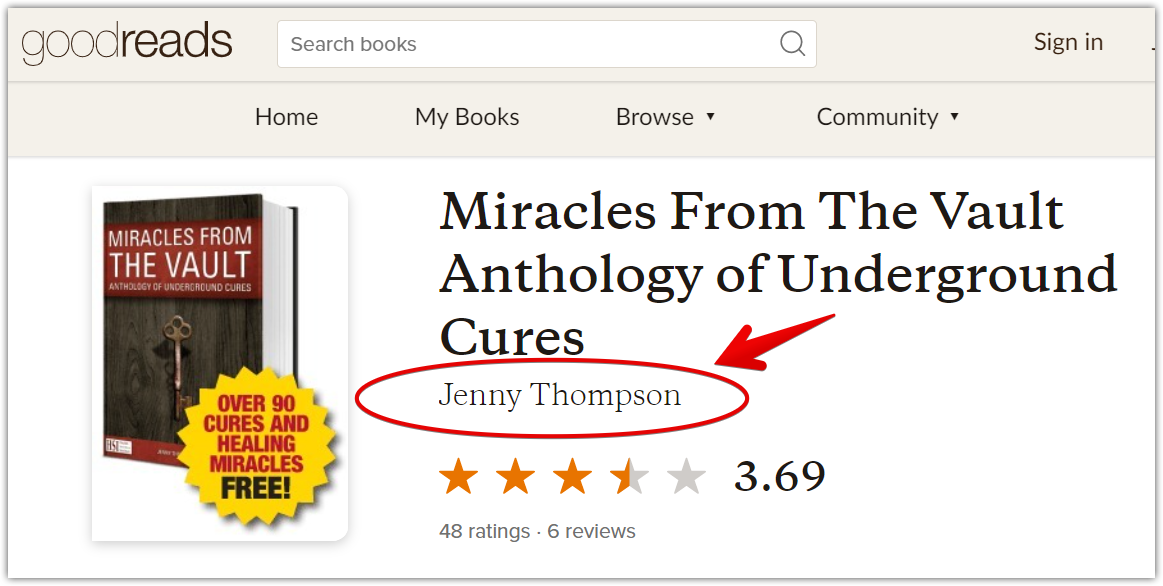
And then, of course, I can't help but show the typical misleading investment promotion. This one is from an Agora company called Outsider Club and teases potential investors with the idea of being able to make profits "as high as 21,608%" (and we already exposed this teaser by the way)...

These kinds of bold claims are usually loosely rooted in fact, covered with deceptive and misleading wording, and designed to trigger daydreams of living in a new mansion and driving a new sports car.
Wrongful Charges
This is another common complaint.
Most accusations of wrongful charges are probably the result of "dark patterns", which are tricks and sneaky ways of getting people to buy or sign up for something that they don't realize.
There's a handful of different sneaky ways they use to sign people up for their newsletters, but one of the most diabolical might be this one: In the past, I've come across order pages that sneakily sign customers up for more than one newsletter, the secondary one as a "free bonus", which often leads the unsuspecting customer to a little surprise when they find a charge for the additional newsletter in the coming months.
Example: You want to order XYZ Newsletter. They give you the "free bonus" of getting 123 Newsletter too, but it's only free for three months. In three months you're surprised about the new charge to your account from the 123 Newsletter because it was a bonus you didn't even want, and unfortunately, there was no way to opt-out of this.
***I don't know if they're still doing this but have seen it before so be careful.***
Deceptive Charges
This fits right in with what I just went over.
Here are some complaints about Stansberry Research with the BBB. They're a bit old but still worth going over. Both are about a little trick Stansberry Research was using where they were selling a book and signing buyers up for their one newsletter service. I guess this wasn't made very clear...

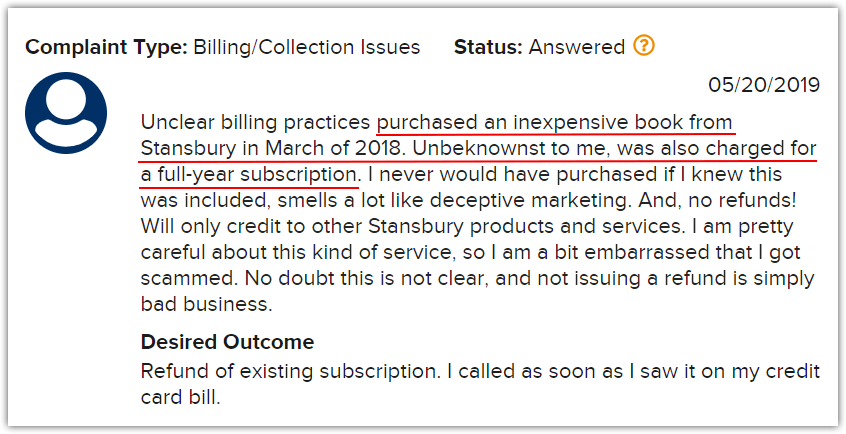
Refund Hassle & Issuing Credits
I've mentioned that refunds can be quite the hassle. This is the way the process is designed. If they've already got your money, why would they want to give it back?
It depends on the service, but most have some sort of refund policy. However, there's no straightforward way to go about getting a refund. Subscribers have to contact the company via email or telephone, and apparently, their customer service is often a disaster.
Here's a complaint with the BBB from someone who had trouble getting a refund for one of Palm Beach Research Group's newsletters...

And below we have more complaints about refunds, this time with Banyan Hill Publishing newsletters...

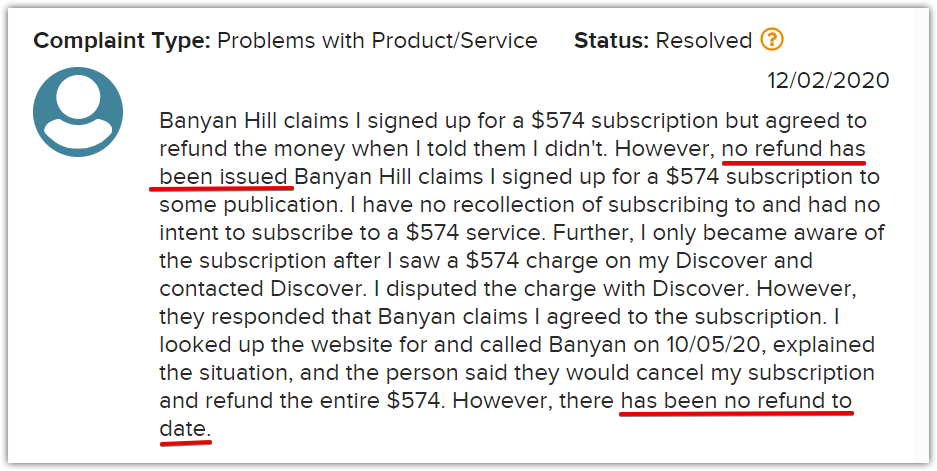
*It's also worth pointing out that in the complaint above the person claims to "have no recollection of subscribing"... possibly due to the sneaky ways Agora companies get people to subscribe without knowing it.
And here we have another review from a subscriber to one of Stansberry Research's newsletters...

Furthermore, many of their services don't have a money-back guarantee. Instead, if you're upset with what you got the only option is to receive credits that go towards another one of their services. In other words, you can't get your money back and you are forced to purchase another one of their services that you probably want nothing to do with at this point.
Spam Galore
If you do join any of their services this is a complaint you will likely have yourself in not too long. They love to blast out the promotional emails, which are typically pretty spammy.
Here's a complaint about spam coming from their Agora Financial company...
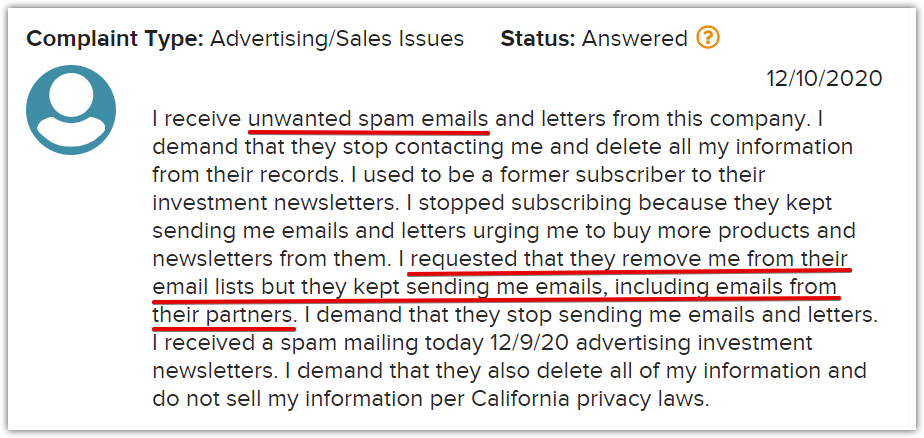
*Note: The above complaint mentions that they are also receiving spam emails from "their partners". So even though you might sign up for, as an example, a newsletter offered by Banyan Hill, you might be getting email promotions for a newsletter offered by one of their other companies.
Here's another example from someone who supposedly didn't receive any product, instead only getting spam (was a complaint against Palm Beach Research).

*Note: Feel free to read reviews for the various Agora companies yourself too. Of course, I can't post all of the negative reviews I've found here. That would just be too many. BBB.org, Trustpilot.com, and PissedConsumer.com are all good places to start.
A "Multi-Legged Marketing Machine"
At this point, you can see that much of the complaints about Agora companies stem from the marketing tactics. While there are some differences between the companies, all seem to be fairly uniform in their marketing blueprints, often using exaggerated and misleading claims loosely based on facts to promote whatever it is they are promoting deceptively... yet still legally, at least most of the time.
The Agora is a "marketing machine", as Truth In Advertising puts it.
This is because The Agora seems to favor their promotional department when it comes to resources, as stated in these employee reviews I found on Glassdoor...
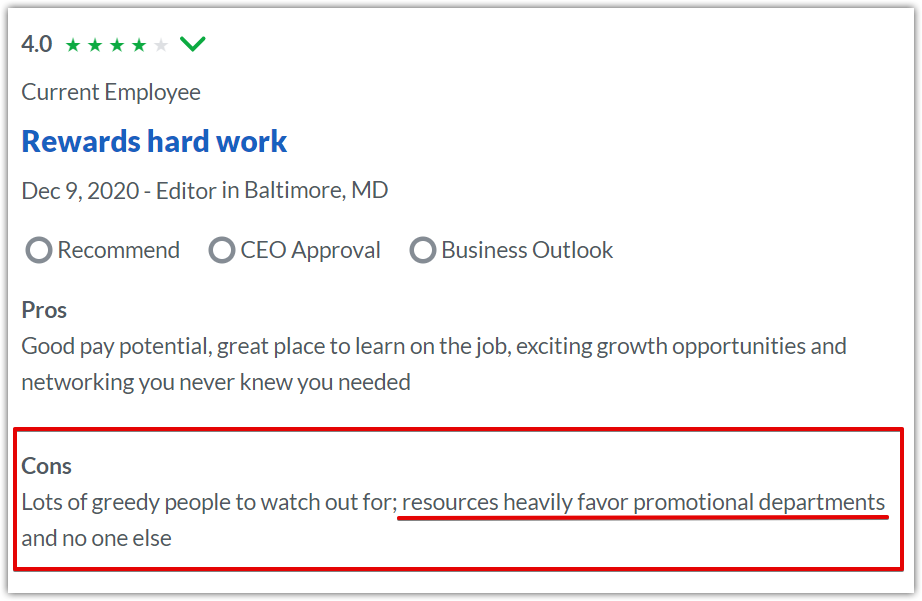

Most reviews from employees left on Glassdoor have been positive about the company. Many of the workers like the challenging and fast-paced work environment. There are some complaints about management and lack of communication between departments, but many describe the work at the various Agora companies as having plenty of room for growth.
However, there are a few reviews I've been able to find from former employees that had a moral problem with the work they performed at the company.
The review below calls the place a "glorified scam" that provides "bogus 'financial advice' that tricks people"...
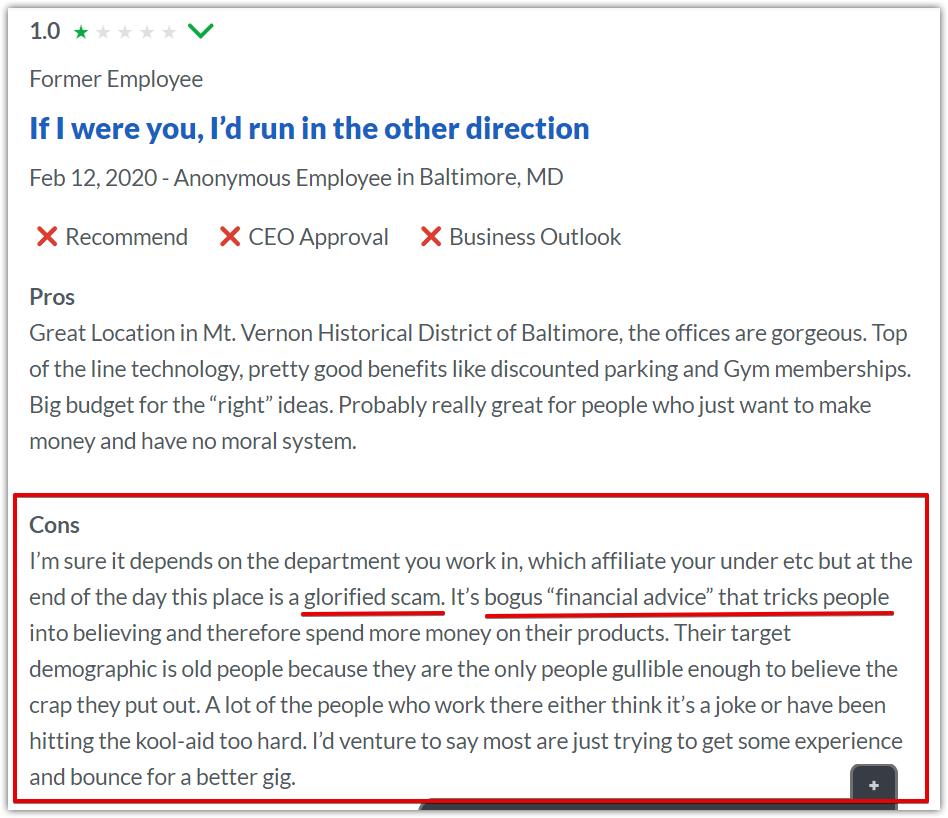
The upside to the job? Well, apparently you can get discounted parking and gym memberships!
And here's a review stating that it's a "fine place to work"... "if you lack a moral compass" that is...

The fact that a lot of their budget goes towards their marketing is quite obvious. This is how the company makes so much money. And this is why a little lawsuit here and there isn't going to bother them.
Sure they got fined over $2 million by the FTC as I mentioned earlier, but I also mentioned that this was only 0.4% of their revenue... hardly a drop in the bucket for them. So financially speaking, it is worth it for them to keep up with the deceptive marketing tactics. They might continue to get sued, but the extra money they'll bring in employing these deceptive tactics will easily cover the fines.
Conclusion - Scam or Legit?
Is The Agora one big massive scam? Are they legit?
This is a question you'll have to answer for yourself. As you can see, the line between what's considered a scam and what's considered legit is a bit blurry. The FTC sued The Agora for, basically, scamming people, yet they continue to use many of the misleading and deceptive marketing tactics, except this time they are getting away with it legally.
But whether or not you consider the company a scam doesn't really matter. The bottom line is that they have proven themselves to be untrustworthy and morally bankrupt. When you think of The Agora, you think of deceptive and misleading marketing. You think of elderly (mostly, but people of all ages too) people being preyed upon to sell some extra subscriptions.
That said, this isn't to say that their services are not worth joining. There are so many companies with so many various services under the umbrella of The Agora, some good and some not so good. Let's also remember that many of the "experts" they have working for them are actually experts with impressive backgrounds.
If you are considering joining one of their many services, the best advice I can give you is to simply do your own due diligence and search for reviews on the particular service in question. Don't fall for the scare tactics, false urgency and hype. And always take what they say with a grain of salt.
I hope this review has been helpful.
As always, here at Green Bull Research we'd love to hear what you think. Let us know in the comment section below.

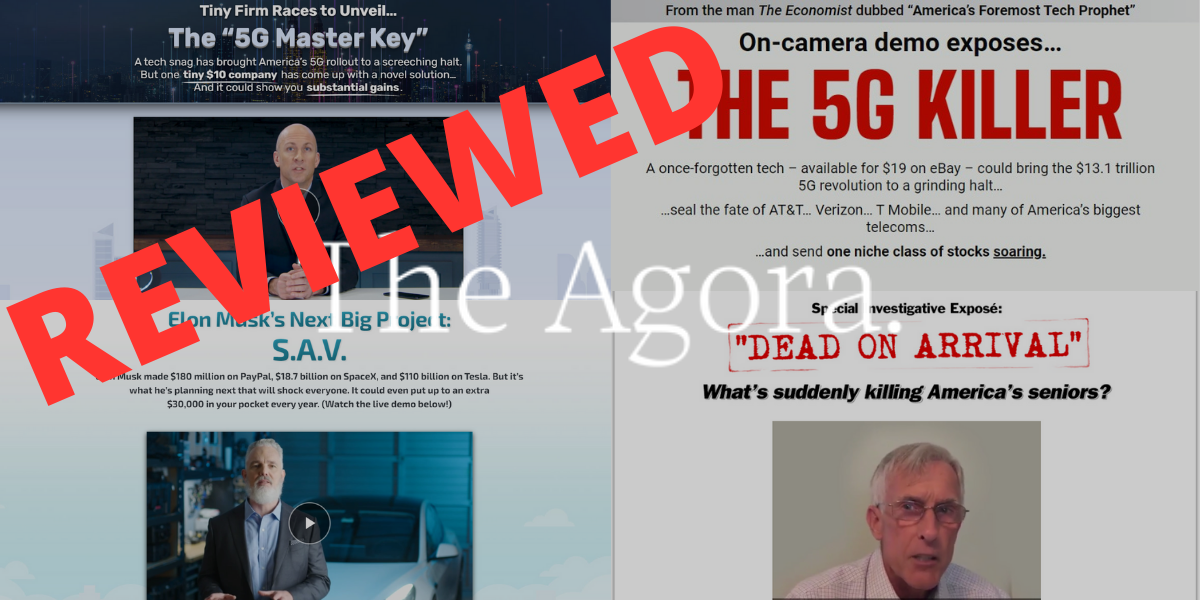
Can you write about Monument & Cathedral (aka Agora) and their ownership of a 2,700 acre community in Nicaragua called Rancho Santana? There is a concern they’re using deceptive practices to attract buyers into that community. The buyers are made promises, then buy a home or land and then that is when the abuse starts. Owners find themselves in a situation where they have to pay exorbitant fees to maintain their homes and property.
Great review. Coincides with my experience with them.
merci vos conclusions qui permettent d’avoir un peu de recule
have read Agora – those that do will find that your wright up of the good and bad is helpful and they would agree
I think you went easy on Agora. They are frauds. Check out Mike Stathis of AVA Investment Analytics. He’s a top expert from Wall Street who exposes all of these fraudsters.